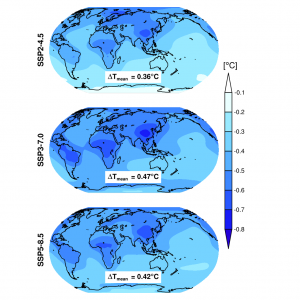Reducing fossil fuel emissions might have greater climate benefits than afforestation
– Gowri R

Climate change, driven largely by human activities, has resulted in rising global temperatures and extreme weather events. There are two major solutions that can help mitigate the effects of climate change – increased afforestation and decreased use of fossil fuels. Both can help reduce the amount of carbon dioxide in the atmosphere, but they may have different kinds of impacts on the overall climate of our planet.

The simulated pattern of surface air temperature difference (averaged over 2471-2500) between the Reduced Fossil Fuel Emission simulation and the Afforestation simulation when the background future greenhouse gas emissions follow three different Shared Socioeconomic Pathway (SSP) scenarios (SSP2-4.5, SSP3-7.0, SSP5-8.5).
A recent Earth System modelling study by Koramanghat Unnikrishnan Jayakrishnan and Govindasamy Bala at the Centre for Atmospheric and Oceanic Sciences, IISc, has used computer simulations to trace the impact of two different scenarios – one in which only afforestation is carried out and another in which only fossil fuel use is reduced – on the climate and carbon cycle. They tracked how various parameters, such as ocean surface temperature, pH, and ocean carbon content, would change over time in the future under these two scenarios.
The results showed that over a long-term period (from 2471 to 2500), reducing fossil fuel emissions can lead to a cooler climate – with a temperature reduction ranging between 0.36°C-0.42°C – compared to the impacts of afforestation, even though the amount of carbon dioxide removed from the atmosphere by the two approaches is the same. This disparity arises because afforestation, while effective at carbon removal, also introduces biophysical changes on the Earth’s surface, such as decreased reflectivity for sunlight and increased evapotranspiration, which together partly offset the cooling effect from carbon removal. In contrast, reducing fossil fuel emissions alone focuses on just preventing carbon dioxide release from fossil fuels, thereby reducing greenhouse gas concentrations without directly altering the land cover or vegetation.
The study suggests that prioritising reduction in fossil fuel emissions may have greater benefits for mitigating climate change than afforestation alone. However, further research is needed to fully understand the biophysical impacts of afforestation before applying these findings to climate policies.


REFERENCE:
Jayakrishnan KU, Bala G, A comparison of the climate and carbon cycle effects of carbon removal by afforestation and an equivalent reduction in fossil fuel emissions, Biogeosciences (2023).
LAB WEBSITE: http://caos.iisc.ac.in/gbala.html






